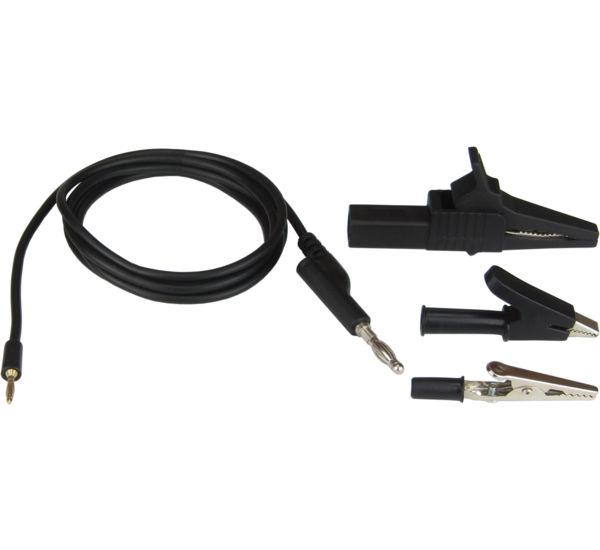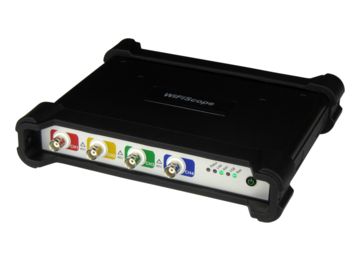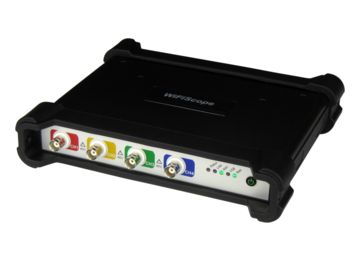
Ground compensation Cable TP-GCC150
The Ground compensation Cable TP-GCC150 is a set with a ground cable and three different size alligator clips.
It is used to add a ground compensation to the following instruments:
- Automotive Test Scope ATS610004DW-XMSG
- Automotive Test Scope ATS605004DW-XMS
- Automotive Test Scope ATS5004DW
Order code: TP-GCC150
EAN: 7423621992937
Price: 15.10
Ground compensation cable
The Ground compensation Cable TP-GCC150 consists of a special ground compensation cable, together with three corresponding ground clips in different sizes.
The 1.5 m long ground compensation cable has a 2 mm banana plug at one end, that plugs into the small banana socket at the rear of differential WiFiScope. The other end has a 4 mm banana plug that connects to an alligator clip that can be connected to the ground of the test subject.
Three different size alligator clips are included:
When using the the ground compensation cable
The ground compensation cable between the differential WiFiScope and test subject is required when the differential WiFiScope is connected to the mains adapter and/or the USB cable, and the test subject is not grounded.
When is the ground compensation not required
The ground compensation cable between the differential WiFiScope and test subject is not required when:
- When the differential WiFiScope is equipped with option SafeGround and an input is switched to single ended (SafeGround is enabled)
- When the differential WiFiScope operates on battery power only
- When the input range of the differential WiFiScope is set to 20 V or higher
Why ground compensation?
Mains power supplies usually have noise filtering capacitors between the mains input and the output. When a device is powered by such power supply and it is not grounded, the device will float relative to the ground. This floating voltage can get as high as the mains voltage. This is however not dangerous because the current that can flow is very small.
When measuring with a differential WiFiScope, this floating voltage can affect your measurements because of the high input impedance of the differential WiFiScope, which is 1 MOhm.
When the differential WiFiScope is only battery powered, your measurements will not be affected, because the differential WiFiScope will also float on the floating voltage of the test subject.
When the differential WiFiScope is connected to the USB or connected to the mains, the floating voltage will cause a high common mode voltage at the input of the differential WiFiScope. The inputs of the differential WiFiScope will then clip and you will get strange measurement readings.
The common mode range of the differential WiFiScope is 2 V (input range 200 mV to 800 mV), 20 V (input range 2 V to 8 V) or 200 V (input range 20V to 80V). So if you measure in the 200mV range and the floating voltage becomes greater than 2 V, the input channel of the differential WiFiScope will clip and you will measure strange readings. If you measure in the 20 V range (or higher) you will suffer much less from the floating voltage because these are usually smaller than 200 V.
When the differential WiFiScope ground is connected to the ground of the test subject, they will both get the same ground level, so there will be no (high) common mode voltage due to floating. You will get no measurement errors then.
The table below shows detailed specifications of the Ground compensation Cable TP-GCC150.
Ground compensation Cable TP-GCC150 | |||
|---|---|---|---|
| Cable | |||
| Length | 150 cm | ||
| Connectors | |||
| Instrument side | 2 mm banana plug | ||
| Alligator clip side | 4 mm banaba plug | ||
| Weight | 25 g | ||
| Alligator clips | Alligator Clip TP-AC80I - Black | Alligator Clip TP-AC10I - Black | Alligator Clip TP-AC5 - Black |
| Connector | 4 mm shrouded banana socket | 4 mm shrouded banana socket | 4 mm banana socket |
| Rated voltage | 1000 V | 60 V | 60 V |
| Rated current | 32 A | 10 A | 5 A |
| Safety | double isolated | ||
| Dimensions | |||
| Length | 82 mm | 58 mm | 60 mm |
| Width | 13 mm | 13 mm | 9 mm |
| Height | 34 mm | 27 mm | 14 mm |
| Clamping range | 22 mm | 12 mm | 10 mm |
| Weight | 13 g | 8 g | 3 g |
| Color | black | black | black |



